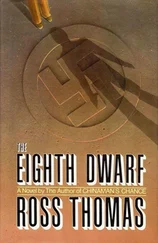Winfield smiled at the Captain. “Good-bye, Captain.”
“Good-bye, sir.”
“Call me,” Patrokis said in Spanish, opened the door and waited for the Captain’s response. When none came, Patrokis went through the door, followed by the General.
The Captain continued to stand almost at attention, staring at the just closed door. The bedroom door behind him opened and a young woman came out, followed by Emory Kite, who wore a too-long black topcoat, a smile and, in his right hand, a .25-caliber semiautomatic with a homemade silencer almost as long as the weapon itself.
“Were you harmed?” the Captain said to the young woman, who hurried to him.
“He did not harm me,” she said and buried her face in his shoulder.
“You both were perfect,” Emory Kite said in soft soothing English. “Both of you were absolutely perfect and I just hope you know how much that means to me.”
Kite brought the silenced semiautomatic up and shot the young Captain in the back of the head, then scuttled around the falling body and shot the young woman in the left temple before she could scream, protest or pray.
It was Claudia Ransaw, a homicide detective sergeant with the Metropolitan
Police, who called Nick Patrokis to ask whether he might be interested in the murder of an ex-Salvadoran Army captain and his wife. Ransaw, the forty-sixth person to join VOMIT, had been a first lieutenant in an Army CID unit until 1981, when she quietly announced she was a lesbian and was just as quietly separated from the service. “Only thing saved me from a DD was my black ass,” she had once told Patrokis.
When Ransaw called him shortly after 6 P.M., she first asked if VOMIT was still “poking around in all that real bad shit in Central America?”
General Winfield had just risen to leave. Patrokis waved him back to the armchair and replied, “Sure. Why?”
“Because we’ve got us a dead Salvadoran ex-Army captain by the name of José Trigueros Chacón, age twenty-nine. And we’ve also got us Senora Trigueros, age twenty-six, who’s just as dead. No passports and not much in the way of ID except for some of his old Army papers and her civilian stuff that gives an address in San Salvador.”
“Where’d it happen?” Patrokis said.
“Over on Mintwood Place just off Columbia Road.”
“What’s it look like?”
“A pro hit. That’s why I’m calling. One shot each. Little-bitty gun, no more’n a twenty-five, maybe even a twenty-two. Nobody saw nothing. Nobody heard nothing. He got it in the back of the head. She got it in the left temple. Been living there a week, maybe less, but the manager’s not around so I can’t even be sure of that.”
“Did you get the wife’s given names?”
“Rosa Alicia,” Sergeant Ransaw said. “You learn anything about anything, you call me, hear?”
“I’ll do that,” Patrokis said, recradled the phone, turned to the General and said, “That was Detective Ransaw.”
“So I gathered,” Winfield said.
“She says our Captain and a woman, who Ransaw believes was his wife, were shot dead not long after we left.”
“Who found them?”
“I didn’t ask.”
“How prudent,” the General said and rose, his face now so pale a stranger might think him faint, although Patrokis knew him to be furious.
Winfield produced a small address book, looked up someone and said, “May I use the phone? I need to ask some questions I should’ve asked long before this.”
The small two-story house was in the 3200 block on the north side of Volta Place just off Wisconsin Avenue in Georgetown. Because it had taken Winfield more than twenty minutes to find a parking place, it was nearly 7:15 P.M. when he rang the bell with his right thumb. In his left hand was a brown paper sack that contained a bottle of J&B whisky.
The door opened the length of its short chain and a tall slim pretty woman in her middle thirties stared at him with enormous gray eyes that seemed to be in mourning. Before Winfield could say anything, the woman said, “He told me to tell you he’s changed his mind. He told me to say he won’t see you.”
“How have you been, Shawnee?” Winfield said.
“Rotten. And you?”
“Not too bad. May I come in?”
“He won’t see you.”
“Perhaps I can change his mind.”
She shrugged, closed the door long enough to unhook the chain, then reopened it. Winfield went into a very small, not quite square entry hall whose only decorations, other than the pretty woman in old jeans and a man’s white shirt, were a brown metal hat rack that looked like government issue and an inscribed color photograph of Ronald Reagan. Winfield remembered that the inscription read, “To Hank Viar with gratitude and admiration.”
Winfield removed his hat, handed the sack of liquor to the woman he called Shawnee, then took off his camel hair coat and hung it and the Borsalino on the borrowed or stolen hat rack. Just beyond it were steep narrow stairs that led up to what he remembered were two bedrooms and a bath. For some reason — age, he suspected — the stairs looked steeper than when he had last seen them seven years ago.
Winfield turned back to the woman, who now held the sack of liquor down at her left side, almost as if she had forgotten it. “How’s — uh — your husband, Shawnee?” Winfield asked, recalling the face, if not the name, of a large young man with strangely gentle features and a mass of dark curly hair.
“He got AIDS and died,” she said.
Instead of offering words of sorrow and commiseration, Winfield gently placed his right hand on her left shoulder. She looked down at the hand with what seemed to be surprise, then up at Winfield. “He thinks I’ve got it now,” she said.
“Hank?”
She nodded. “He thinks AIDS is part of God’s special curse on the parents of certain boomers. The rest of the curse is that these boomers will dwell in the house of their parents forever. So I get myself tested every month and the results are always negative. But he says the test results look like forgeries to him and makes me use one cup, one glass, one plate and one knife, fork and spoon. He’s really kind of nutty now.”
She gave her head two abrupt shakes, as if to clear her mind. The shakes made her long auburn hair swirl and almost writhe. Winfield patted her shoulder and removed his hand just as she said, “Well, fuck Daddy dear. You wait in the living room and I’ll tell him you won’t leave till he comes down.”
“He’s not in bed, is he?”
“No, but he spends a lot of time upstairs in the front bedroom, keeping an eye on the street. I don’t know who he’s expecting. Maybe a delegation of those Kurds he helped fuck over years ago.”
She handed back the sack of liquor and started slowly up the stairs. The General watched her for a moment, then turned and headed for the living room, wondering whether it was still stuffed with the relics and leavings of the past four decades.
The living room offered five reminders of plain Danish modern from the 1960s. A wealth of chrome, glass and leather represented the ’70s, and the ’80s were remarked by three flexible floor lamps that hovered over easy chairs, as if about to pounce. The only artifact from the 1990s was a new 32-inch Sony television set. On the nearby VCR were four gaudily packaged rental videos, all of them pornographic. Winfield was reading their titles when Henry Viar entered the room and said, “You want ice?”
“Not really,” said Winfield as he turned to examine Viar — all six-foot-four of him — who now appeared to weigh less than 160 pounds. He noticed Viar had lost more than weight. He also had lost much of his hair and the loss made the long, long face look even longer. Yet, it remained a tight, closed-up face, the kind that belongs to someone who no longer goes out much, orders most of his food and drink by phone and speaks only in monosyllables to those who deliver it.
Читать дальше












